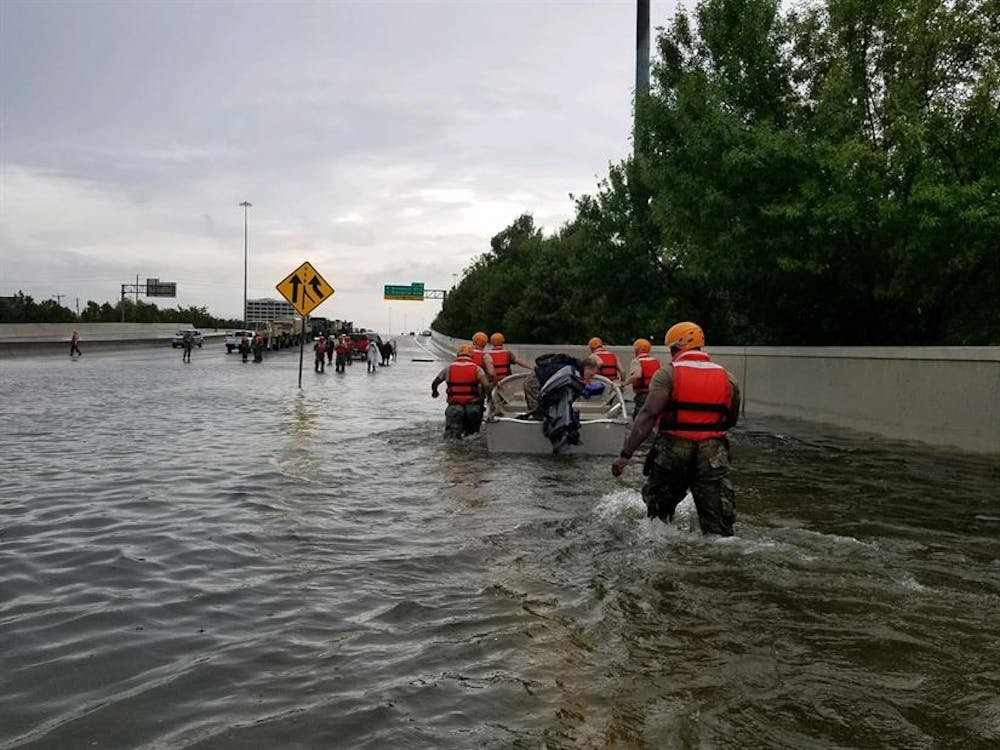Houston, Texas is under water. Side-by-side photos in The New York Times show nearly a third of the city submerged by Hurricane Harvey, a Category 4 storm that hit the western part of the Gulf Coast with over 50 inches of rain in the last week. CNN reported that the death toll in Houston has risen to 40 people.
With a Campus Ministry mission statement promoting “concern for the dignity of every human being”, it seems natural for members of the University of Portland community to want to provide relief for those displaced by the natural disaster.
However, with a surge of social media calls to action, it can be challenging to find the right ways to help out.
Despite what you might have heard, not all aid is equal. If you are considering donating to those affected by Harvey, make your money count.
Things to avoid
Texas is not a Goodwill. Don’t send that knappy sweater your grandma bought you five Christmases ago.
Some people feel better donating clothing and goods as opposed to cash because there is more uncertainty as to where that money is really going. But watch this CBS news clip about piles of clothing — including a prom dress and high heels — rotting on an Indonesian beach. You’ll think twice about sending a trash bag full of t-shirts.
Speaking of money and not knowing where it’s going...
Former president Barack Obama and a slew of celebrities have urged their Twitter followers to donate to the Red Cross, but students might want to do some research on ways the organization has “bungled” its aid in the past. In an investigation last June, reporters with NPR and ProPublica found that the nonprofit spent a quarter — or almost $125 million — of the money people donated after the 2010 Haiti earthquake on its own internal expenses.
A rep for The Red Cross told The Washington Post on Sunday that it had set up 34 shelters in Texas. However, there may be better places to put your resources.

Donating Directly
The internet and crowdfunding have fostered a culture of giving directly in times of crisis. Worried that your funds won’t go directly to those people suffering on the front page of The Times? In a world of Facebook, GoFundMe and PayPal, you can track them down and put your donations directly in their debit accounts. Celebrities have set up crowdfunding campaigns on sites like YouCaring. JJ Watt, defensive player for The Houston Texans, has raised over 14 million on his YouCaring campaign.
On a more personal level, specific families affected by the hurricane have set up GoFundMe and YouCaring pages. Here’s a popular one helping a 3-year-old girl who lost her mother to the floods. There are other, smaller campaigns on YouCaring focused on helping families rebuild after the disaster.
There are some downsides to donating through crowdfunding sites. GoFundMe takes out 5% of all donations, and around 2.5% is taken out for processing. There is also an uncertainty surrounding the benefactors of these campaigns. Be sure to check sites like gofraudme.com to determine whether you are donating to families actually suffering from the Texas storm or some guy in Oklahoma trying to benefit off their tragedy.
Be Specific
Donating funds for shelters and water supply — big ticket items — is great, but often this leaves out the specific needs of certain populations. There are a variety of organizations catered to specific groups of people who often get overlooked.
Black Women’s Defense League has set up a fund specifically to help women and their children fleeing abuse during the crisis.
The Montrose Center has a fund specifically for the LGBTQ communuty. RAICES, a Texas-based nonprofit legal advocacy group, has been working with Texas shelters to find housing for women and children left stranded after being released from Immigration and Customs Enforcement (ICE) detention centers.
Living Hope Wheelchair Association assists victims with spinal cord injuries and other disabilities.
Giving locally is almost always a safer bet, according to ProPublica’s 5 Tips for Donating after Disasters. Houston Mayor Sylvester Turner established a Harvey relief fund at The Greater Houston Community Foundation. The organization connects donors with a network of nonprofits and innovative solutions in the social sector.
Remember to research where you donate and hold organizations accountable for releasing information about how your money is being spent. There are a variety of websites like Guidestar and Charity Navigator that can help you determine where and when to give.
Ultimately, just think critically about where your money is going. Don’t reflexively toss cash at goods causes to make yourself feel better. Be strategic about where your resources will do the most good.








